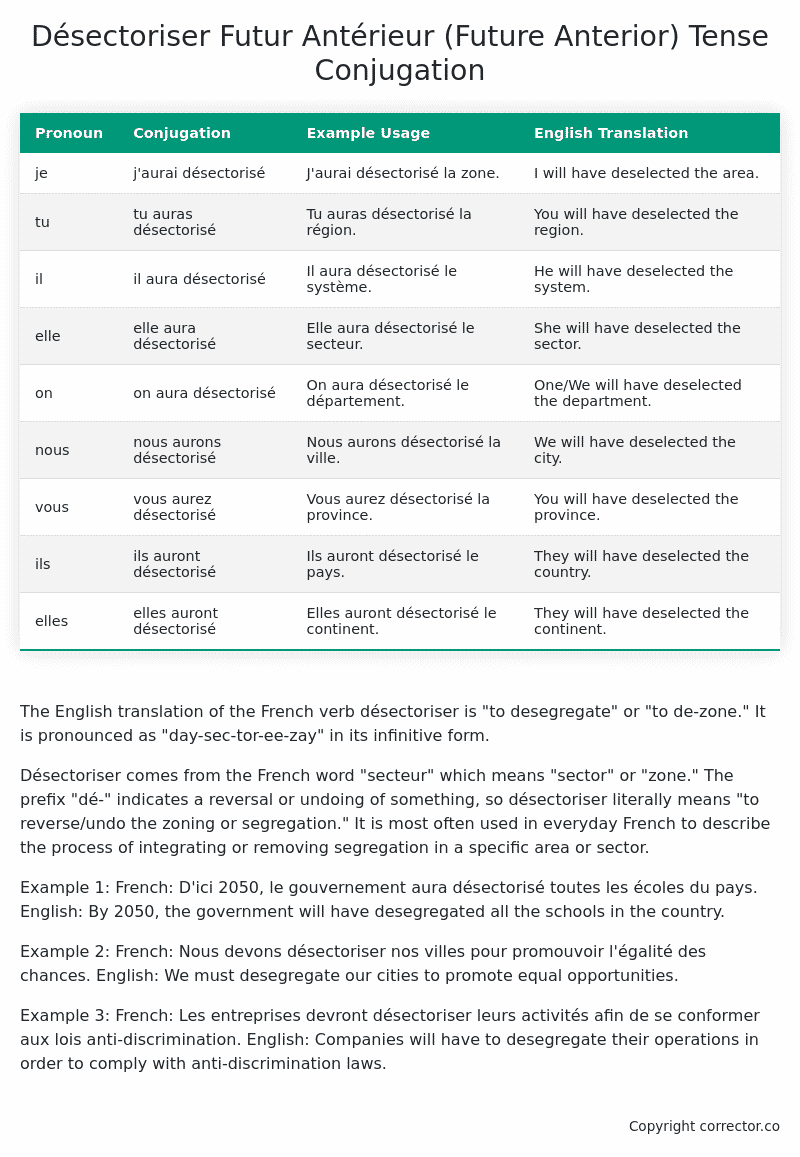Futur Antérieur (Future Anterior) Tense Conjugation of the French Verb désectoriser
Introduction to the verb désectoriser
The English translation of the French verb désectoriser is “to desegregate” or “to de-zone.” It is pronounced as “day-sec-tor-ee-zay” in its infinitive form.
Désectoriser comes from the French word “secteur” which means “sector” or “zone.” The prefix “dé-” indicates a reversal or undoing of something, so désectoriser literally means “to reverse/undo the zoning or segregation.” It is most often used in everyday French to describe the process of integrating or removing segregation in a specific area or sector.
Example 1:
French: D’ici 2050, le gouvernement aura désectorisé toutes les écoles du pays.
English: By 2050, the government will have desegregated all the schools in the country.
Example 2:
French: Nous devons désectoriser nos villes pour promouvoir l’égalité des chances.
English: We must desegregate our cities to promote equal opportunities.
Example 3:
French: Les entreprises devront désectoriser leurs activités afin de se conformer aux lois anti-discrimination.
English: Companies will have to desegregate their operations in order to comply with anti-discrimination laws.
Table of the Futur Antérieur (Future Anterior) Tense Conjugation of désectoriser
| Pronoun | Conjugation | Example Usage | English Translation |
|---|---|---|---|
| je | j’aurai désectorisé | J’aurai désectorisé la zone. | I will have deselected the area. |
| tu | tu auras désectorisé | Tu auras désectorisé la région. | You will have deselected the region. |
| il | il aura désectorisé | Il aura désectorisé le système. | He will have deselected the system. |
| elle | elle aura désectorisé | Elle aura désectorisé le secteur. | She will have deselected the sector. |
| on | on aura désectorisé | On aura désectorisé le département. | One/We will have deselected the department. |
| nous | nous aurons désectorisé | Nous aurons désectorisé la ville. | We will have deselected the city. |
| vous | vous aurez désectorisé | Vous aurez désectorisé la province. | You will have deselected the province. |
| ils | ils auront désectorisé | Ils auront désectorisé le pays. | They will have deselected the country. |
| elles | elles auront désectorisé | Elles auront désectorisé le continent. | They will have deselected the continent. |
Other Conjugations for Désectoriser.
Le Present (Present Tense) Conjugation of the French Verb désectoriser
Imparfait (Imperfect) Tense Conjugation of the French Verb désectoriser
Passé Simple (Simple Past) Tense Conjugation of the French Verb désectoriser
Passé Composé (Present Perfect) Tense Conjugation of the French Verb désectoriser
Futur Simple (Simple Future) Tense Conjugation of the French Verb désectoriser
Futur Proche (Near Future) Tense Conjugation of the French Verb désectoriser
Plus-que-parfait (Pluperfect) Tense Conjugation of the French Verb désectoriser
Passé Antérieur (Past Anterior) Tense Conjugation of the French Verb désectoriser
Futur Antérieur (Future Anterior) Tense Conjugation of the French Verb désectoriser (this article)
Subjonctif Présent (Subjunctive Present) Tense Conjugation of the French Verb désectoriser
Subjonctif Passé (Subjunctive Past) Tense Conjugation of the French Verb désectoriser
Subjonctif Imparfait (Subjunctive Imperfect) Tense Conjugation of the French Verb désectoriser
Conditionnel Présent (Conditional Present) Tense Conjugation of the French Verb désectoriser
Conditionnel Passé (Conditional Past) Tense Conjugation of the French Verb désectoriser
L’impératif Présent (Imperative Present) Tense Conjugation of the French Verb désectoriser
L’infinitif Présent (Infinitive Present) Tense Conjugation of the French Verb désectoriser
Struggling with French verbs or the language in general? Why not use our free French Grammar Checker – no registration required!
Get a FREE Download Study Sheet of this Conjugation 🔥
Simply right click the image below, click “save image” and get your free reference for the désectoriser Futur Antérieur tense conjugation!

Désectoriser – About the French Futur Antérieur (Future Anterior) Tense
Construction
Common Everyday Usage Patterns
Interactions with Other Tenses
For example
Summary
I hope you enjoyed this article on the verb désectoriser. Still in a learning mood? Check out another TOTALLY random French verb conjugation!


